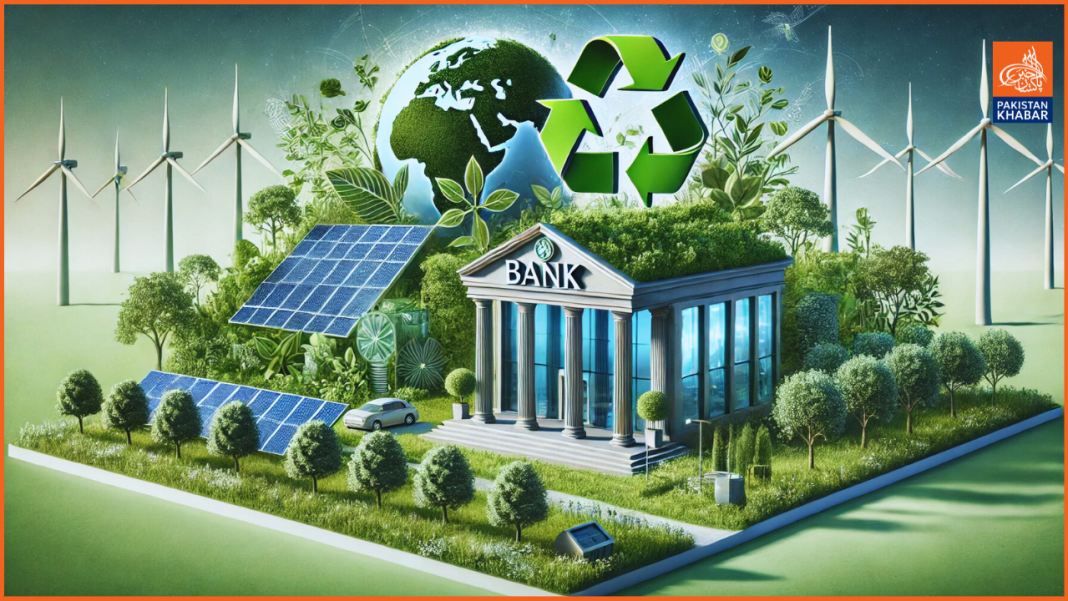Green banking: A pathway to financial sustainability and environmental resilience
Green banking represents a significant shift in the financial sector, with banks realigning their investment strategies to prioritize sustainable technologies and eco-friendly initiatives. These financial institutions are leading the charge in sustainable banking, actively promoting clean energy solutions and seeking innovative ways to address climate change.
With the Air Quality Index (AQI) in certain regions of Pakistan surpassing hazardous levels of 1,000 this year, concerns over the responsibilities of government and institutions have escalated. Among the sectors often overlooked in this conversation is the banking industry.
As a major contributor to Pakistan’s economy, accounting for roughly 55 percent of the country’s GDP, the banking sector holds substantial influence. This prompts an important question: What role has the banking industry played in addressing the ongoing challenges of smog and hazardous AQI levels?
To combat these challenges, the banking industry has largely relied on the Green Banking Guidelines (GBG) issued by the State Bank of Pakistan (SBP). The GBG are designed to promote sustainable banking practices and reduce the carbon footprint resulting from financial operations.
Sustainable banking has the potential to empower Pakistan’s financial sector in tackling environmental challenges.
The GBG also focus on how banks can mitigate environmental and social risks in lending by financing green projects. These guidelines state that a bank’s green banking policy should include a commitment to funding businesses that aim to reduce their carbon footprint, improve resource efficiency, and mitigate environmental impact. While this policy establishes a framework, its implementation and effectiveness remain subjects of scrutiny.
However, green banking goes beyond financing climate resilience projects. Banks can influence environmental outcomes by adopting eco-conscious lending and investment policies. Mission-driven initiatives might include offering loans for electric vehicles, financing home solar systems, or encouraging businesses to adopt more sustainable practices. Additionally, banks can avoid investing in environmentally harmful industries like fossil fuels, aligning their operations with the United Nations Sustainable Development Goals.
Besides promoting climate-friendly practices, banks can integrate sustainability into their operational models. Steps such as adopting paperless banking systems, using energy-efficient technologies in branches, and supporting remote banking services can significantly reduce their environmental footprint.
These efforts have already begun, especially with the rise of digital banking, which has contributed to the shift towards online, cashless transactions. Moreover, initiatives like the “Go Green” option, introduced by 1Link, where customers are charged a small fee for printing ATM receipts, have led to a reduction in paper waste.
These actions, combined with broader green investment strategies promoted by the SBP, highlight the potential for banks to take a leadership role in fostering a cleaner, greener Pakistan.
However, despite these possibilities, the adoption of green banking in Pakistan faces substantial challenges, including limited awareness, lack of enforcement, and insufficient integration of green policies across the sector.
For green banking to drive real change, the banking industry must not only adopt but also champion green initiatives, making sustainability a core aspect of their operations rather than an additional effort.
In an era where environmental concerns are more pressing than ever, green banking presents both an opportunity and a responsibility. The long-term sustainable growth of the country depends on the development of green banking. How the banking industry rises to this challenge will define its legacy, not only as an economic driver but as a steward of environmental resilience.
The writer is a researcher currently working on a book on Islamic finance. Join DawnMedia’s Breathe Pakistan initiative to combat climate change.




